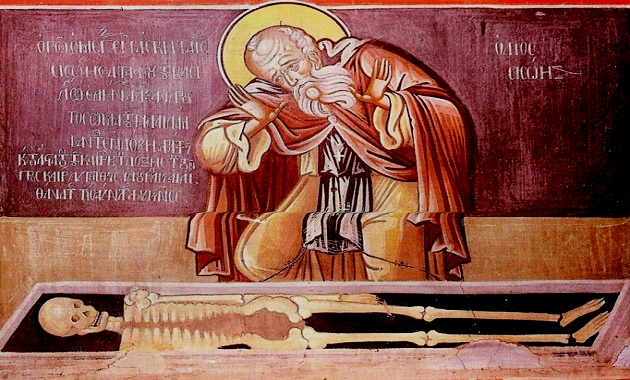What is the memory of death and what does it mean?
18 September 2018[Previous post: http://bit.ly/2D5yi1R]
The memory of death (memento mori) helps us to overcome the old person because it brings humility to our soul. When we forget death, we have the illusion that we’re never going to die and this increases our arrogance, our greed, our worship of our bodies, the desire to exploit other people. The memory of death gives us a sense of our boundaries upon this earth and the importance that our actions, our words, our thoughts have for eternity and life after death.
So it helps us to confront this present life with seriousness, in the light of eternity, so we don’t waste our life on earth living in a prodigal way, carelessly, superficially and indifferent towards the consequences. That’s why it was said also by the wise ancient Greek, Socrates, that: ‘Those who philosophize correctly are actually practising to die and fear death less than people’.

St John Chrysostom advises that we visit cemeteries frequently so that we can reflect on the vanity of human matters. We all know that after a visit to a cemetery we’re more humble, more merciful, less attached to material things, more open to God and other people.
The memory of death about which St John of the Ladder and other holy Fathers have written a great deal, isn’t anything to do with some sick, melancholic or neurotic condition. That would hardly be beneficial to the soul because it would create despair, which would need to be overcome with the assistance of a spiritual guide.
God-centred memory of death is a charismatic and spiritual state which brings humility, peace and joy to the soul. It’s a gift from God and we must seek it from God.
How is the remembrance of God achieved?
The more people overcome the egocentric life and love God more, the more they think about God. People think about that which concerns them and that which they love. This is what the Lord said: ‘For where your treasure is, there your heart will be also’.
The study of the word of God in Holy Scripture and in the Fathers of the Church, our encounter with spiritual people that love God, fervent prayer, regular attendance at holy services and our frequent and worthy participation in Holy Communion, increase in us the love of God, and thus the remembrance of God.
Saint Gregory the Theologian advises us: ‘It’s more important to remember God than to breathe’. That is, we ought to think of, and remember God even more than we draw breath.
The constant remembrance of God brings a deep peace and joy to the soul, even during the most difficult situations of life.






